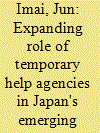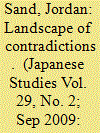|
|
|
Sort Order |
|
|
|
Items / Page
|
|
|
|
|
|
|
| Srl | Item |
| 1 |
ID:
090590


|
|
|
|
|
| Publication |
2009.
|
| Summary/Abstract |
This paper discusses one aspect of learning Japanese as a second language (L2), which is how learners acquire Japanese causative constructions. Causatives are considered to be rather 'marked', because main and sub-events are merged into a single clause, and thus may be more difficult to learn. Yet, ability to use such constructions enhances expressivity and pragmatic-cultural appropriateness, and facilitates comprehension. Cross-sectional oral production data were collected from English-speaking university students of Japanese L2 for this study. Their descriptions of causative eventualities were examined and related to their L2 developmental stage. Results show that the range of choices of construction correlates with learners' stage of development and consequently (i) that there are universal constraints in L2 learning, as proposed by Processability Theory, and (ii) that Japanese L2 development follows a predictable route. Results entail implications for accurate, efficient communication as well as for Japanese L2 learning and teaching.
|
|
|
|
|
|
|
|
|
|
|
|
|
|
|
|
| 2 |
ID:
090587


|
|
|
|
|
| Publication |
2009.
|
| Summary/Abstract |
One of the most poetic and mysterious photographic projects of the post-1945 period, Fukase Masahisa's 'Karasu' [Ravens] is here examined in relation to the photographer's entire body of work, his writings, interviews with his family and friends, and consideration of the influence of loss, melancholia, and psychological instability in his art. Although Fukase remains associated with the 'personal photography' movement of the 1960s and 1970s, it is argued that he was, above all, a committed experimenter in photographic narration and self-representation, factors important to the reading and understanding of 'Karasu'. Claims that the ravens in Fukase's images symbolically represent a life now regarded as tragically sorrowful and ill-fated are evaluated and partly challenged.
|
|
|
|
|
|
|
|
|
|
|
|
|
|
|
|
| 3 |
ID:
090589


|
|
|
|
|
| Publication |
2009.
|
| Summary/Abstract |
The key role of temporary help agencies in the expansion of the external market for labor in Japan is the subject of this article. As a result of deregulatory changes in and after 1999 in Japan, the temporary help industry has impacted on changes in firms' reliance on external labor. Based on a survey of and interviews at temporary agency firms, we found considerable heterogeneity among THAs. One segment of large agencies exhibited a strong market orientation in supplying business services, while two other segments of THAs were continuing, to varying degrees, to draw their business from either capital-related or parent companies within their groups.
|
|
|
|
|
|
|
|
|
|
|
|
|
|
|
|
| 4 |
ID:
090585


|
|
|
|
|
| Publication |
2009.
|
| Summary/Abstract |
This essay brings the issues of these two fields together to reappraise the meaning of suburban living within the mental landscape of the early twentieth-century Tokyo suburbanite. The focus is on two texts by popular novelist Tokutomi Roka, who moved to the suburban farming hamlet of Kasuya in 1907. Roka's romantic sensibility toward the landscape and his internal emotional dilemmas are interpreted as integral to one another and forming an archetypal pattern for the bourgeois male intellectual's experience of the modern suburb in Japan.
|
|
|
|
|
|
|
|
|
|
|
|
|
|
|
|
| 5 |
ID:
090588


|
|
|
|
|
| Publication |
2009.
|
| Summary/Abstract |
Greater Osaka, a hub of commerce and industrial production during the interwar period, was the site for rapid development of diaspora communities, whose significant contribution to the regional music-culture has been little documented. This article describes three contexts for music-making among the largest ethnic minorities, the Koreans and Okinawans, on the basis of primary textual, oral and musical sources, as well as an emerging body of writings on Okinawan music in Osaka. People from Korea and Okinawa were involved in the broader musical life of the metropolis in diverse ways, as professional performers, and as producers and consumers of recordings. The reception of such 'foreign' music and musicians reflected the status accorded them in the colonial system and its underlying racial ideology.
|
|
|
|
|
|
|
|
|
|
|
|
|
|
|
|
| 6 |
ID:
090586


|
|
|
|
|
| Publication |
2009.
|
| Summary/Abstract |
This paper considers two unforeseen outcomes of the primacy of the t?jisha in current LGBTQ discourse. Firstly, through insisting on attending to the voice of each individual, it has proven difficult to establish common links among discriminated communities (or within communities) because of widely diverging perspectives. Also, given the broad variety in many individuals' experience of non-normative sexuality, having to identify and speak as a t?jisha has engendered normalizing effects. The current primacy of the t?jisha reinforces developmental narratives of sexual-identity formation (only the 'out' homosexual is truly authentic) and in so doing inadvertently silences those unable or unwilling to prioritize the sexual in their presentation of self, or whose modes of self-expression fall outside current orthodoxies that provide the boundaries for sexual-minority identification.
|
|
|
|
|
|
|
|
|
|
|
|
|
|
|
|
|
|
|
|
|